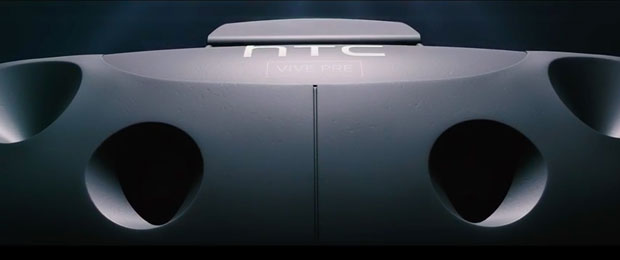A room-sensing camera planted on the front of the Vive Pre was the reason the release ofValve andHTC’s virtual reality headset was delayed, the companies revealed Tuesday at CES 2016.
The Vive VR headset was supposed to beat Oculus VR and Sony to the punch, coming out in the last quarter of last year instead of launching well into 2016.
A last-minute “breakthrough” required more work on the Vive headset, HTC CEO Cher Wang said last month.
It wouldn’t have been fair to early adopters to release hardware just to meet the December shipping target, she said.
That breakthrough was the room-sensing camera, and it just might be a proper answer to one of VR’s nagging questions: How will I know what’s going on around me while I’m immersed in VR?
The camera has two primary functions. It can show a green outline of the room and objects within it at the press of a button, and the “Chaperon” feature will highlight obstructions, such as walls and furniture, in blue whenever a wearer wanders too close to something.
HTC and Valve showed off other Vive improvements. The headset itself is more compact, its strap redesigned for stability, and its displays brightened for clarity and sharpness.
The Vive’s base station is quieter and more compact, and its tracking abilities have been improved, HTC said.
The updates to the Vive platform extend to its controllers. Gone are the Atari-like nunchucks, replaced with controllers that look more like Oculus VR’s offerings — their edges have been softened, buttons retextured, and bodies updated with grip pads.
Horses in This Race
The room-sensing camera and Chaperon system distinguish the Vive headset from the other top-tier contenders. While Facebook’s Oculus VR and Sony focus on sit-down experiences, HTC and Valve have been inviting consumers to stand up and walk around their virtual worlds.
The key to the walk-around VR experience is keeping users in bounds, said Kevin Krewell, principal analyst at Tirias Researcher.
He tried out the previous edition of the Vive headset and its old system of staking out boundaries with its tracking system.
“That experience of being able to [walk around virtual worlds] is kind of like the Holodeck from Star Trek: The Next Generation, where, when you get to a wall, the outline of the area shows up so that you know that you’re reaching the limits of the space of your virtual reality experience,” Krewell told TechNewsWorld. “It’s actually very cool and a very useful way of approaching.”
The Rift has the potential to offer a similar walk-around experience. Last summer, Oculus VR began showing off its work on its own room-scale tracking system.
It isn’t uncommon for there to be several contenders in a market growing around a new platform, noted SuperData Research CEO Joost van Dreunen.
It’s important to keep Microsoft’s success in mind, he told TechNewsWorld. The company launched the Xbox at a time when many people said there wasn’t room for a third game console.
“To date, the Xbox One has outsold its predecessor, so, provided the comparison holds, it is entirely possible that there is room in the VR market for several devices,” van Dreunen said. “It is content that will provide the determining factor here.”
Content Is King
Price has been on people’s mind since the Oculus Rift first asked for help on Kickstarter in 2012.
The content is what matters more than cost to consumers, according to van Dreunen.
“Consumers don’t buy hardware; they buy the entertainment, or applications, that come with the device,” he said. “Whenever you observe the launch of a new device, it coincides with the release of new content.”
Every generation of Nintendo consoles has come with a new Zelda and Super Mario game, van Dreunen said. For the Rift, Facebook and Oculus VR are throwing in two games — platformer Lucky’s Tale and space combat sim Eve Valkyrie — and a controller.
“It’s because the average consumer doesn’t care about hardware specs or how shiny the box looks,” he said “but rather go for whatever device offers them the best entertainment.”




















































